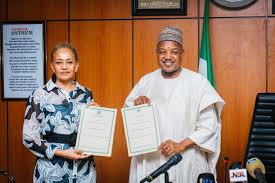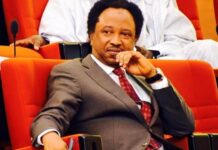Nigeria and the United Kingdom have recently signed eight new partnership agreements worth 589 billion naira (£272.6 million). These deals aim to improve governance, fight climate change, and enhance education and health in Nigeria. The agreements, signed by Senator Abubakar Bagudu, Nigeria’s Minister of Budget and Economic Planning, and Ms Cynthia Rowe, UK Charge d’Affaires, demonstrate a significant step in the ongoing partnership between the two countries.

The agreements cover various areas, including governance, climate change, education, health, and economy. The total value of the agreements is substantial, with the Human Assistance and Resilience Program (HARP) alone receiving 324 billion naira (£150 million) over three years. Other notable agreements include the Nigeria Governance and Climate Change Programme (NGCP), Strengthening Peace and Resilience in Nigeria (SPRING), and Manufacture Africa, which aims to create jobs and boost economic growth.
The UK’s commitment to supporting Nigeria’s development is evident in these new agreements, which add to over £1 billion already spent on various programs across Nigeria. Ms Rowe emphasized the UK’s dedication to helping Nigeria overcome its development challenges, particularly in areas such as health, climate change, and governance, which are now global concerns affecting multiple countries.
The impact of these agreements is expected to be significant, providing life-saving support in crisis situations, promoting sustainable economic development, empowering women and girls, and attracting honest and reliable investments to Nigeria. The Nigerian government sees these agreements as crucial for overcoming current challenges and achieving its Renewed Hope agenda.
The economic context of these agreements is important to consider. Recent economic reforms in Nigeria have caused some discomfort, but Senator Bagudu explained that these changes are part of a broader strategy to stabilize the economy and attract both local and foreign investments. The UK’s long-term commitment to Nigeria’s development, spanning various sectors, including human development, conflict resolution, and economic transformation, demonstrates a shared commitment to overcoming obstacles and fostering growth.
The partnership between Nigeria and the UK, as represented by these new agreements, is a significant step towards creating a more stable, inclusive, and prosperous Nigeria. As both countries face economic challenges, this collaboration demonstrates a shared commitment to overcoming obstacles and fostering growth.




